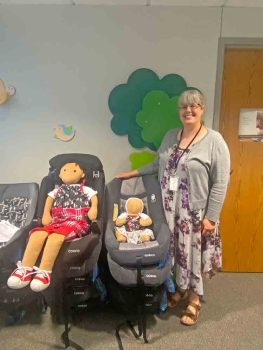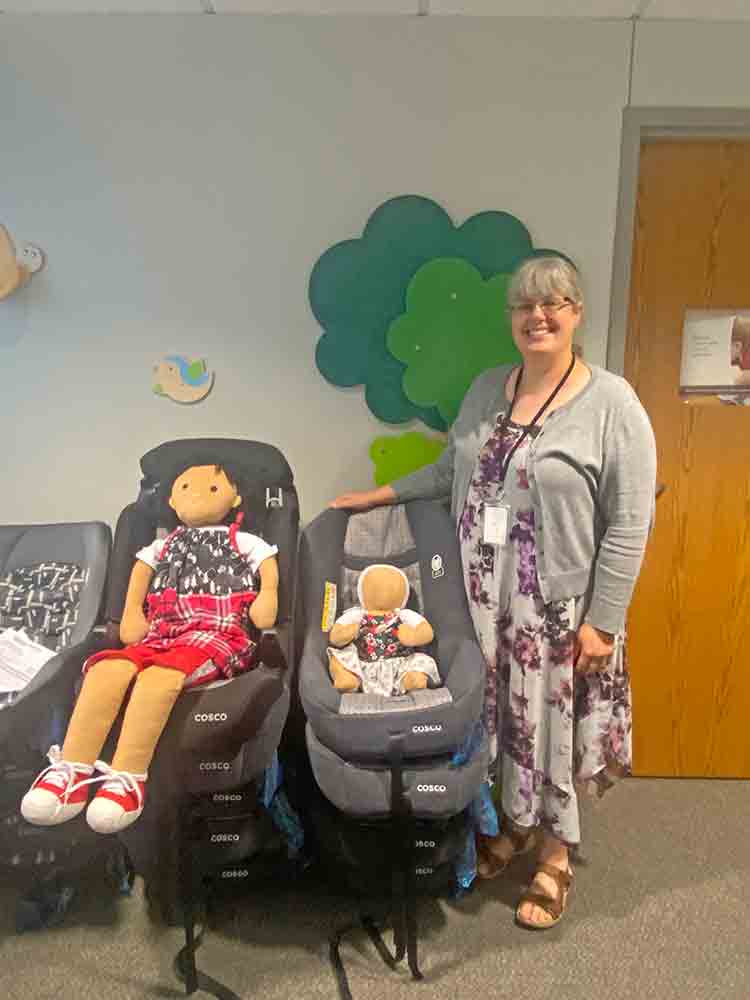
Photo by Charlene Corson Selbee
“Ninety percent of car seats, nationally, are misused,” quoted Brenda Pohlman, CPS (Child Passenger Safety) Technician Proxy. “That number is higher in Fillmore County.”
Fillmore County Public Health has Blue Plus, UCare, and Office of Public Safety grant car seats, and now the Gift of Safety grant.
Fillmore County Public Health was one of three Minnesota organizations to receive a Gift of Safety Grant from Toyota and Cincinnati Children’s Hospital this spring. As a result, the organizations received 50 car seats and the Buckle up for Life (BUFL) program curriculum. The goal is to distribute all 50 seats within a year to families needing a new car seat. Grant recipients are responsible for reporting how many are distributed per quarter and capturing demographic information from families.
On Thursday, September 15, Fillmore County Public Health is hosting a car seat clinic for families needing a car seat. The clinic is open to the public, starts at 1 p.m., and runs until 3:30 p.m. Appointments are required. Each appointment is 30 minutes per child, and parents will meet with a certified technician. The car seats are large and long as they will fit children from birth to 65 pounds. The training is being held in the Fillmore County Highway Department garage, 909 Houston Street, NW, Preston. Call the Fillmore County Public Health general number, (507) 765-3898, or Pohlman’s direct number, (507) 765-2636, to reserve a spot. There are no income level requirements.
Pohlman noted that she is the only Child Passenger Safety Tech (CPST) trained in Fillmore County. Therefore, Fillmore County is hosting a train the trainer class on September 13, 14, and 15. There will be three participants from Fillmore County Public Health, three from Houston County Public Health, and students from Minnesota and Wisconsin. Currently, there are 12 on the waiting list. At the end of the training, participants must take an examination and participate in the car seat clinic on the 15th.
Owners who wonder if their car seat has expired or has been recalled will need the manufacturer’s name, brand name, year, and model number. Pohlman shared that the state publishes a recall list for technicians.
After a crash, owners should contact the manufacturer and ask to speak to the child passenger safety technician.
Pohlman shared that car seats purchased from garage sales are not recommended. In addition, used car seats are highly discouraged. She added that eating in a car seat is not recommended, especially sticky foods or syrupy drinks. Car seats should not move more than 1”.
If you travel out of state, you must follow the laws of the state in which you are traveling. Pohlman emphasized that these are the minimum requirements in Minnesota (www.dps.mn.gov), but parents can do better:
• In Minnesota, all children must be in a child restraint until they are 4’9” tall, or at least age eight, whichever comes first.
• Rear-facing child seats – Keep your child rear-facing as long as possible. Your child should remain in a rear-facing car seat until they reach the top height or weight limit allowed by your car seat’s manufacturer: age 1 plus 20 pounds. Rear-facing car seats are for birth to four syears old in Minnesota.
• Forward-facing seats – Once your child outgrows the rear-facing car seat, your child is ready to travel in a forward-facing car seat with a harness and tether. Keep your child in a forward-facing car seat with a harness and tether until they reach the top height or weight limit allowed by your car seat’s manufacturer.
• Booster seats – Use after outgrowing a forward-facing harnessed restraint; safest to remain in a booster until 4’ 9” tall, or at least age eight, whichever comes first.
• Seat belts – Use when children can sit with their back against the vehicle seat and have their knees bent comfortably over the edge with their feet touching the floor.
Pohlman said clients are referred to Public Health through programs like WIC and Family Home Visiting. Law enforcement also refers parents and clients who come in off the street. Fillmore County Public Health also conducts car seat clinics throughout the year. Appointments last between 30 and 45 minutes per child.
During the appointment, technicians go through an intensive checklist and show the clients how to install the car seat in their cars. The technician will also help the client register their car seat.
Pohlman said that she has helped up to 15 in one day and 200 in a year. In 2022, she has already met with over 70 and expects to train a total of 100 or more this year.
Fillmore County will be receiving a demonstration bench in September. It is a vehicle seat with different seat belt styles, so families can be shown how to correctly install their child’s car seat depending on their seat belt. Also, the demonstration bench will come in handy when the weather is cold or if someone does not have a vehicle, as they might have ridden with someone else.


Leave a Reply